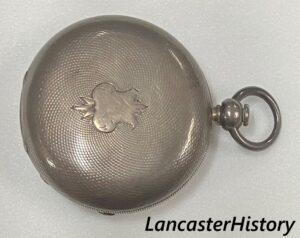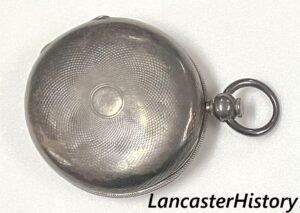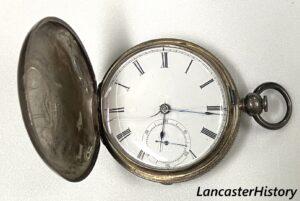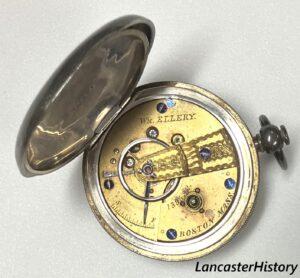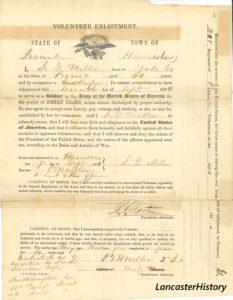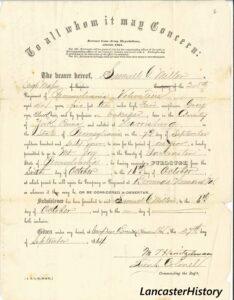Keeping Time with Buchanan and Lincoln
A Pocket Watch for Union Soldiers
Nestled away in a drawer in the LancasterHistory Decorative Arts Center is a Civil War era pocket watch with a fascinating story and an interesting connection to both James Buchanan and Abraham Lincoln. Manufactured by the American Watch Company of Waltham, Massachusetts, the William Ellery Model 1857 pocket watch became a favorite of soldiers during the Civil War.
Named in honor of William Ellery, one of two signers of the Declaration of Independence from neighboring Rhode Island, the reasonably-priced $13 timepiece quickly became the favorite of soldiers interested in purchasing a comparatively inexpensive timepiece for their personal use. The cartouche on the front cover of the watch would often include the initials of the owner; however, the cartouche on the LancasterHistory watch remains blank. By the end of the Civil War, the “soldier’s watch” proved to be a tremendous success, accounting for nearly half of the company’s annual sales.
A Tantalizing Inscription
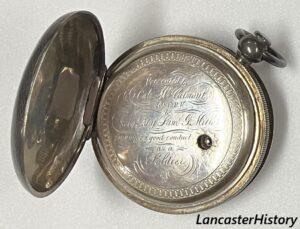
The William Ellery watch in the LancasterHistory collection includes a hinged front cover to protect the watch face and back cover to protect the movement. Since this watch is wound with a key, a second interior cover called a cuvette protects the movement from the owner inserting the key in a way that might cause damage. Since this watch was given as a gift, the presenter had the following inscribed on the cuvette:
Presented by / Col. McCalmont / 208th P.V. / to / Sergt. Maj. Saml G. Miller / for uniform good conduct / as a / Soldier”
Unfortunately, we do not know who donated the watch to LancasterHistory, when the donation was made, or when the watch was given to Sergeant Miller by Colonel McCalmont. What we do know from company production records is that the factory manufactured William Ellery watch movement with serial number 139582 sometime between November and December 1864 as an 18-Size Full-plate model featuring 11 jewels and housed in a coin silver case.
The Buchanan Connection – Alfred Brunson McCalmont
James Buchanan (1791-1868) and Alfred McCalmont (1825-1874) were both born in Pennsylvania and attended Dickinson College. McCalmont, however, was born in the town of Franklin in Venango County while Buchanan was born in the town of Cove Gap in Franklin County. Although they both attended Dickinson, the elder Buchanan graduated from the college in 1809 while the younger McCalmont graduated many years later in 1844.
Following his graduation from Dickinson College as joint top of his class, McCalmont returned to Franklin to study law. He passed the bar in 1847 and set up his practice in Pittsburgh. He became active in both city and state politics and actively campaigned for James Buchanan in the 1856 presidential election. He served as one of the new Assistant Attorney-Generals of the United States in the Buchanan Administration under fellow Pennsylvanian Jeremiah Sullivan Black. He served in the position until 1861 when the new Lincoln Administration assumed office.
McCalmont’s Civil War Service
At the outbreak of the Civil War, McCalmont helped to raise a company of volunteer infantry in Franklin. The unit became part of the 142nd Pennsylvania Volunteer Infantry (P.V.I.) with McCalmont as Lieutenant Colonel. The unit saw action at Fredericksburg in December 1862, Chancellorsville in April 1862, and Gettysburg in July 1863. McCalmont assumed command of the unit when its Colonel, Robert P. Cummins, was killed during the first day of the battle on July 1. He served in this position until April 1864 when he took command of the new 208th Pennsylvania Volunteer Infantry regiment then being recruited and organized.
Ready for active service in September 1864, the 208th joined the final campaigns of the war, including siege operations against Petersburg and Richmond and the Appomattox Campaign. Colonel McCalmont was brevetted Brigadier General, U.S. Volunteer on March 13, 1865 for “gallant services during the war.” He led the 208th in the Grand Review victory celebrations in Washington on May 23, 1865 and mustered out with the rest of the regiment on June 1. He returned to Franklin where he resumed his law practice. He ran unsuccessfully for Congress in 1866 and was briefly considered as a candidate for governor in 1872.
The Lancaster Connection – Samuel G. Miller
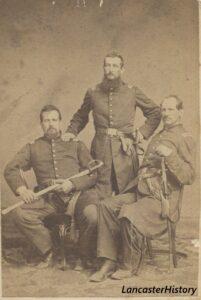
Little is known about Samuel Miller (1820-1897) before his enlistment at the age of forty-two in 1862 as captain of Company H., 135th Pennsylvania Volunteer Infantry (P.V.I.). His enlistment was for a nine-month period. There is conflicting information about his place of birth, some sources referring to an unspecified location in York County, others to Mount Joy in Lancaster County. What is certain is that he spent most of his life in Lancaster County, primarily in the town of Marietta where he is listed at various times as a plasterer, innkeeper, or tavern keeper. He was hospitalized at Carver Hospital in Washington, from April 22 through May 12, 1863 and was honorably discharged with his company on May 24, 1863.
On September 7, 1864, Miller re-enlisted as a private with Company G of the 208th Pennsylvania Volunteer Infantry under the command of Colonel McCalmont. Benjamin F. Miller served as captain of Company G. His period of enlistment was for one year. He was promoted to Sergeant Major on September 12. He was honorably discharged with the rest of his regiment on June 1, 1865. Although Miller served his country with honor during the war and was commended for “uniform good conduct as a soldier” by his commanding officer, his obituary notes “Samuel died May 30, 1897 and is listed in the cemetery records [Marietta Cemetery] as “Destitute Veteran Burial.”
The Lincoln Connection
Abraham Lincoln once owned an American Watch Company William Ellery Model 1857 pocket watch similar to the one in the LancasterHistory collection. As the story goes, Lincoln was presented the watch soon after his Gettysburg Address in November 1863. Sometime soon after, Lincoln gave it to his cousin Dennis F. Hanks who had traveled to Washington and on the way had been robbed of his own pocket watch. In an affidavit shortly before his death in May 1891, Hanks recorded the following information:
I, Dennis F. Hanks, aged ninety-two years, make the following statement of Abraham Lincoln, and a watch once owned by him and now in possession of Mrs. M.M. Barney a granddaughter of mine: This watch was presented to me by Abraham Lincoln in 1864 at Washington, D.C., where I had to intercede for some men who had been in a riot in Charleston, Ills. The watch he gave me is a silver “Waltham” case No. E279- Wm. Ellery movement – key-winder- No. 67613 Boston, Mass.
The watch passed through several hands before being acquired by well-known Lincoln collector Roy P. Crocker in 1959. Crocker placed the watch on permanent display of the Lincoln Savings and Loan Association in Los Angeles. In March 1977, thieves broke into the offices of the savings and loan and stole the watch. To this day, its whereabouts remain unknown. In an odd turn of fate, the watch generously given to Dennis Hanks after the theft of his watch was now a victim of the same circumstance.
A Heartfelt Gift
The relationship between a colonel and a sergeant major is primarily professional, based on the chain of command and a shared responsibility for leading and supporting soldiers. While the colonel commands the unit, providing leadership and strategic direction, the sergeant major serves as the senior enlisted non-commissioned officer to oversee training, discipline and morale. While a professional relationship is the primary focus, a bond of mutual respect and trust as a result of shared experiences and camaraderie over time, especially in times of war, often times only serves to deepen that bond.
Such must have been the case between Colonel McCalmont and Sergeant Major Miller. While we may never know the depths of that relationship or what event or events prompted the gift of the inscribed “soldier’s watch,” it was obviously heartfelt since any gifts given by the colonel to his senior non-commissioned officer were given in appreciation and not related to any formal commendation or award of merit.
LancasterHistory is proud to be the custodian of this “soldier’s watch” and to recognize the service of Pennsylvanians Samuel G. Miller and Alfred B. McCalmont to the Union cause.
From Object Lessons
